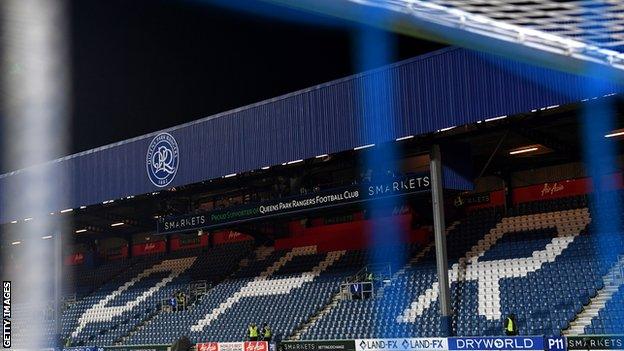Financial Fair Play: QPR agree £42m settlement after breaking spending rules
- Published

The London club were fined for breaking spending limits after their promotion to the Premier League in 2014
QPR have agreed a settlement of almost £42m with the English Football League after an arbitration panel dismissed the Championship club's claims that Financial Fair Play rules are unlawful.
The settlement includes a £17m fine, paying £3m of the EFL's legal costs and the agreement from club shareholders to write off £22m of outstanding loans.
QPR will also be under a transfer embargo for the January 2019 window.
It is believed the EFL have agreed to a payment schedule over 10 years.
The London club's case relates to breaking spending limits on their way to winning promotion to the Premier League in 2014, with QPR's wages of more than £75m making up 195% of their turnover of £38.6m.
The settlement was reached before QPR's appeal, which was due to be heard on 2 July, against the panel of arbitration's ruling that FFP rules were both lawful and a fine of £41.965m was not disproportionate.
QPR chief executive Lee Hoos said that while they felt they had a "strong case for appeal", the settlement "is in the best interest of football as a whole".
"QPR felt it was best to put this matter behind them to enable all parties to have certainty and allow us to continue focusing on running the Club in a sustainable manner, going forward," Hoos added in a joint statement with the English Football League.
The settlement over historical FFP spending is the second to be reached this month by the EFL, with Bournemouth paying just £4.75m - having originally been expected to pay a fine of £7.5m - for breaking rules when they won promotion in 2014-15.
'EFL conscious of financial burden on QPR'
While the overall fine element, upheld by October's arbitral hearing, was vastly reduced, having QPR's owners agree to effectively write off £22m worth of outstanding debts by converting that amount into share capital will help strengthen the club's balance sheet.
The club's owners will not be able to redeem the £22m of share capital.
EFL chief executive Shaun Harvey said: "In agreeing to the settlement above, the board was conscious that the financial burden placed on the club had to be manageable, so as not to put its future in doubt when considering that after this season the club will no longer benefit from the promotion that was the catalyst for the dispute in the first place.
"The outcome vindicates the approach of the EFL board in defending the challenge to our rules."
According to QPR's 2017 financial accounts, the club owed £46m in loans to its owners.
Since relegation back to the Championship after just one season in the Premier League, QPR have reduced wage spending year on year, with the latest accounts from 2017 showing that 64% of their turnover was spent on wages.
However, they have made pre-tax losses totalling more than £17.4m in their first two seasons back in the second tier.
No part of QPR's settlement with the EFL will be taken into account in future calculations relating to profitability and sustainability rules.
BBC Sport understands that while it has yet to be decided where exactly the fine money will be spent, it will go towards football projects in the community.